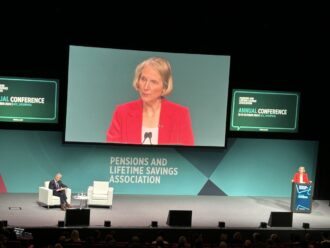Pensions supporting the UK’s economic growth agenda was a much-debated topic at the PLSA’s investment conference in Edinburgh with the heads of investment at four major schemes at the centre of the discussions.
Liz Fernando, Nest’s chief investment officer, highlighted how investors need more certainty in the UK outlook. “The one thing investors don’t like is uncertainty,” she said. “So having visibility on the regulatory regime, the returns regime and ideally inflation as well, as that comes into your forecasting horizons. The more visibility and certainty you can get, the easier you can commit capital.”
Tony Broccardo, the head of investment at Barclays Pension Fund, added that there is an issue of incentivising investors. “It feels we are at just the beginning of the debate. There is the question about how you incentivise asset allocation and where that allocation goes to have a huge impact.”
But he added his fund is already British focused. “Our liabilities are British. Like most investors we own retail parks, property, shopping centers, etc. We have quite a few government bonds,” Broccardo said.
Wyn Francis, chief investment officer at the BT Pension Scheme, made the point that pension funds are a diverse bunch. “Not all pension funds are the same. We are all working with different objectives.”
Concerning the UK economic growth emphasis on investment, he added: “There is a focus [within the debate] on equity exposure of pension funds. The analysis we have done shows our exposure is upwards of 60%, if you count gilts, corporate bonds, private equity, infrastructure and real estate.
“So we need to be a little bit nuanced about what the opportunities are, and my request is if we do get a co-ordinated [growth investment] approach we are smarter than looking at just the equity market.”
Local Pensions Partnership Investments’ Richard Tomlinson pointed out the non-financial benefits of the UK’s growth agenda. “Is it possible that you can end up with improved ESG characteristics for your portfolio [with UK investments]? It is possible,” the chief investment officer said.
In addition, Tomlinson highlighted how many wide-ranging areas are often cited within the economic growth investment debate. “There are some glib comments made, like putting money into venture capital. There is a huge deficit between the different asset classes and opportunities. People talk about investment in high tech, but it is a difficult skill set to invest in that successfully. So there is thinking more broadly about where you shift the needle as investors.”
Fernando highlighted another concern. “One thing that does worry me is mandation of investment. Whether that is mandation by geography or asset class, I generally think you should let market forces play out and investors will choose the best risk-returns opportunities. If those are in the UK, that is fantastic,” she said.
“We absolutely don’t discriminate against the UK. We say we won’t avoid the UK, but we don’t favour the UK either. If the opportunities are there with the return profile, we will put assets to work there.”
Fernando added that about 45% of Nest’s illiquid assets are in the UK.
Broccardo also made an interesting point in regard to international investors. “Any UK investment vehicle should be just as attractive to overseas investors as it is to UK investors. We need that international validation,” he said.





Comments